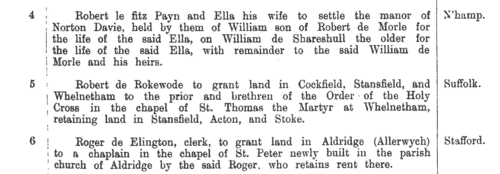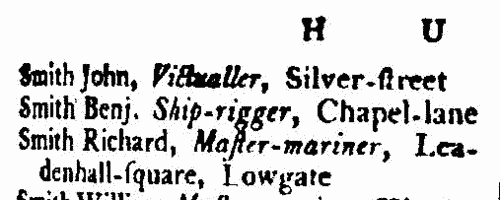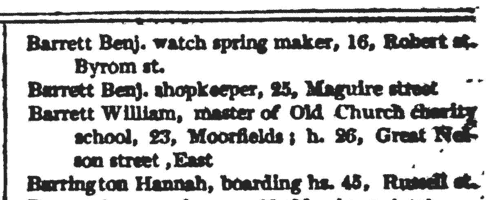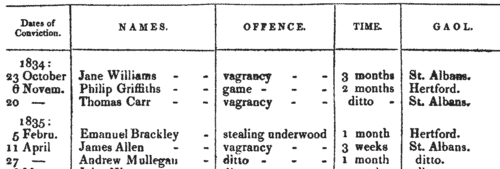Profit Surname Ancestry ResultsOur indexes 1000-1999 include entries for the spelling 'profit'. In the period you have requested, we have the following 28 records (displaying 1 to 10): Single Surname Subscription | | | Buying all 28 results of this search individually would cost £142.00. But you can have free access to all 28 records for a year, to view, to save and print, for £100. Save £42.00. More... |
These sample scans are from the original record. You will get scans of the full pages or articles where the surname you searched for has been found. Your web browser may prevent the sample windows from opening; in this case please change your browser settings to allow pop-up windows from this site. Landowners and tenants in Herefordshire
(1345-1485)
Inquisitions ad quod damnum were held by the appropriate sheriff or escheator (or other officer in whose bailiwick the matter in question might lie) to investigate cases in which the royal or public interest might be damaged by proposed alienation or settlement of land (especially alienation to religious uses, into mortmain). The key findings from these inquisitions were as to the tenure of the land and the service due from it; its yearly value; the lands remaining to the grantor, and whether they sufficed to discharge all duties and customs due from him; and whether he can still be put upon juries, assizes and recognitions, so that the country be not burdened by his withdrawal from them. Generally speaking, this process had the makings of a system of licensing such alienations, and raising money in proportion to the valuations. Equally, there are many items that deal with subjects such as the closing of public roads, the felling or inclosing of woods, or the proposed grant of liberties or immunities. A calendar of these inquisitions from the 19th year of the reign of king Edward III to the 2nd year of Richard III was prepared by the Public Record Office and published in 1906. We have now indexed this calendar by surname and county. Most of the individuals appearing in the calendar are either pious individuals seeking to make grants to religious bodies for the sake of their souls; or landowners securing the disposition and settling of their real estate. But some other names do appear - tenants, trustees, chaplains and clerks.PROFIT. Cost: £6.00.  | Sample scan, click to enlarge

| Merchants and traders in Aberdeen
(1399-1631)
A. M. Munro searched the council registers of the royal burgh of Aberdeen, and compiled this list of burgesses admited to the borough. The entries prior to 1591 were contained in lists engrossed in the council registers at the close of the minutes for the year ending at Michaelmas, but after that date in addition to the annual lists, which are continued, there is almost always a separate minute of admission under the respective dates. The records before 1591 are not only sparser, often with no more than a name, but are also lacking for 1401-1405, 1413-1432, 1434-1435, 1518-1519, 1557 and 1562-1564 - other blanks were filled in from the guildry accounts where such existed. Guild burgesses were allowed unfettered trading rights in Aberdeen; simple burgesses could only deal in Scottish wares (so being barred from the lucrative English and Flemish imports and exports); trade burgesses were limited to their own particular trades; and the council was able ex gratia to create honourary burgesses, who were accorded the full privileges of burgesses of guild and trade, and among whom numbered members of almost every family of note in Aberdeenshire. Burgesses could thus be created by descent, by apprenticeship into a trade, or ex gratia, and in the later portions of this roll the precise circumstances are usually given, sometimes also with the name of a cautioner or surety. Burgesses, masters and cautioners are all indexed here.PROFIT. Cost: £4.00.  | Sample scan, click to enlarge

|  Masters of Apprentices registered in Northumberland
(1741-1745) Masters of Apprentices registered in Northumberland
(1741-1745)
Apprenticeship indentures and clerks' articles were subject to a 6d or 12d per pound stamp duty: the registers of the payments usually give the master's trade, address, and occupation, and the apprentice's father's name and address, as well as details of the date and length of the apprenticeship. There are central registers for collections of the stamp duty in London, as well as returns from collectors in the provinces. These collectors generally received duty just from their own county, but sometimes from further afield. (The sample entry shown on this scan is taken from a Norfolk return)PROFIT. Cost: £8.00.  | Sample scan, click to enlarge

|  Masters of apprentices registered in Newcastle upon Tyne
(1755) Masters of apprentices registered in Newcastle upon Tyne
(1755)
Apprenticeship indentures and clerks' articles were subject to a 6d or 12d per pound stamp duty: the registers of the payments usually give the master's trade, address, and occupation, and the apprentice's name, as well as details of the date and length of the apprenticeship. There are central registers for collections of the stamp duty in London, as well as returns from collectors in the provinces. These collectors generally received duty just from their own county, but sometimes from further afield. The indentures themselves can date from a year or two earlier than this return. (The sample entry shown on this scan is taken from a Liverpool return. Each entry has two scans, the other being the facing page with the details of the indenture, length of service, and payment of duty.) IR 1/52PROFIT. Cost: £8.00.  | Sample scan, click to enlarge

|  Apprentices
(1769) Apprentices
(1769)
Apprenticeship indentures and clerks' articles were subject to a 6d or 12d per pound stamp duty (late payment of the 6d rate attracted double duty (D D) of 12d): the registers of the payments usually give the master's trade, address, and occupation, and the apprentice's name, as well as details of the date and length of the apprenticeship. 2 January to 31 December 1769.PROFIT. Cost: £8.00.  | Sample scan, click to enlarge

|  Clerks and apprentices
(1781) Clerks and apprentices
(1781)
Apprenticeship indentures and clerks' articles were subject to a 6d or 12d per pound stamp duty: the registers of the payments usually give the master's trade, address, and occupation, and the apprentice's name, as well as details of the date and length of the apprenticeship. 2 January to 15 January 1781. IR 1/30PROFIT. Cost: £8.00.  | Sample scan, click to enlarge

| Inhabitants of Holywell in Flintshire
(1790-1797)
The provincial sections of the Universal British Directory include lists of gentry and traders from each town and the surrounding countryside, with names of local surgeons, lawyers, postmasters, carriers, &c. (the sample scan here is from the section for Hull). The directory started publication in 1791, but was not completed for some years, and the provincial lists, sent in by local agents, can date back as early as 1790 and as late as 1797.
PROFIT. Cost: £6.00.  | Sample scan, click to enlarge

| Inhabitants of Liverpool
(1824)
Volume I of Edward Baines's History, Directory, and Gazetteer of the County Palatine of Lancaster, published at Liverpool in 1824, includes this directory of Liverpool, which in addition extends to cover those principal inhabitants living on the Cheshire side of the Mersey.PROFIT. Cost: £4.00.  | Sample scan, click to enlarge

| Dissolutions of Partnerships
(1828)
Trade partnerships dissolved, or the removal of one partner from a partnership of several traders
PROFIT. Cost: £6.00.  | Sample scan, click to enlarge

| Minor offenders in Tywardreth, Cornwall
(1834-1835)
Justices of the Peace throughout England and Wales had the power of summary conviction for certain minor offences, principally vagrancy, poaching, petty theft, bastardy and assault. The magistrates' clerks for each district were required by Parliament to make a return of the names, offences, terms of imprisonment, and whether a written record was made of the proceedings, for the period from Michaelmas (29 September) 1834 to Michaelmas 1835. The return vary in completeness from magistrate to magistrate - the fullest returns also give the offender's address, the amount of fine or length of imprisonment, and/or the names of the justices. PROFIT. Cost: £6.00.  | Sample scan, click to enlarge

|
Research your ancestry, family history, genealogy and one-name study by direct access to original records and archives indexed by surname.
|













